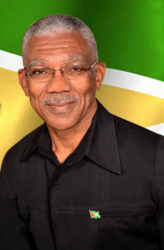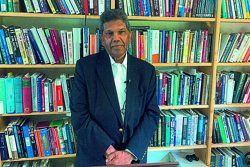President David Granger has had a list of judicial nominees from the Judicial Service Commission (JSC) for several months and has not acted upon it.
The government has made no statement on why this is the case but the delay in addressing the JSC recommendations has raised concerns following a statement by Attorney General Basil Williams that the President has discretion in making these appointments.

Former Attorney General Anil Nandlall yesterday expressed concern at the Granger administration’s apparent lack of interest in dealing with this issue.
“The recruitment of more judicial persons…must be a continuous exercise if we are to seriously address delay and backlog in the system”, he said adding to recent statements made by the PPP/C about Granger’s failure to appoint the judges that the JSC, a constitutional commission, had recommended.
Stabroek News has learnt that sometime earlier this year the JSC submitted a list with the names of four persons to fill the vacancies of judges in the High Court and the Court of Appeal. This was done several months ago and there is no indication that JSC has received a response.
Attempts yesterday to reach the Chairman of the JSC, Chancellor Carl Singh were unsuccessful. His secretary indicated that he was unavailable.
Nandlall, like the PPP, is perturbed that the recommendations are yet to be acted on.
He said that while in government the PPP/C administration had recognized that the increased number of judges was one of the mechanisms by which delays in the system can be effectively addressed.
In this regard, he said the then government increased the complement of High Court judges in 2013 from 12 to 20 and also at the same time made budgetary allocations to the judiciary to increase the physical capacity of the High Court to accommodate an increased number of judges. He said that these budgetary allocations resulted in the construction of a new building to house the Family Court as well as another to house the judges of the Land Court. The latter building is currently under construction.
Continuous
“The recruitment of more judicial persons therefore must be a continuous exercise if we are to seriously address delay and backlog in the system. It is clear that this is not a priority for this administration”, he said while accusing the government of playing politics with the appointment of judges.
“The only reason why there is a delay in acting on the recommendation of the JSC in the appointment of these judges is because the president finds those recommended not politically acceptable”, he charged while noting that this by itself is a violation of his constitutional responsibility.
Nandlall explained that if the president does not agree with the recommendations made, he sends the list back to the JSC requesting their reconsideration.
If having reconsidered the JSC sends back the same list, then the president is mandated to appoint that list of persons, he said.
He said that based on his knowledge, two High Court judges were recommended for elevation to the Court of Appeal. Two recommendations were also made to fill the vacancies that would have existed in the High Court. He could not definitively say when the list of recommendations was sent to the president but was adamant that it was done earlier this year.
Nandlall accused the Attorney General and Minister of Legal Affairs Williams of attempting to create the impression that these JSC recommendations were made under the previous administration. “That is a complete falsehood. The president has no discretion and has no other role to play in relation to the recruitment of judges other than appointing them based upon recommendations received from the Judicial Service Commission’, he said.
Senior Counsel Ralph Ramkarran has accused Williams of “shredding the constitution” by stating that the president has discretion in deciding whether to appoint the judges that were recommended.
Ramkarran was responding on Sunday in his column in this newspaper to the contents of a letter penned by Williams and published in this newspaper earlier this month.
Ramkarran pointed out that in 2001 the authority of the JSC had been strengthened and the discretion of the President in appointments was removed by the substituting of the word “shall” for “may”.
Ramkarran pointed out that Article 128(1) of the Constitution now provides that judges other than the chancellor and chief justice are appointed by the President “who shall act in accordance with the advice of the Judicial Service Commission.” Article 128(2) also now provides that “the President shall act in accordance with the advice of the Judicial Service Commission and appoint a person to act in the office of Justice of Appeal or Puisne Judge, as the case may be.”
Nandlall told Stabroek News yesterday that the arguments which he saw being advanced by Williams are completely erroneous.
“The arguments advanced by Williams are that the president has some larger role to play and the executive will embark upon placing public advertisements for judges are completely ultra vires the constitution and in violation of it. Neither the executive government nor the president has any such power. If the Judicial Service Commission wants to resort to such a course then it is for the JSC to determine that”, he said.
He stressed that the Executive cannot dictate to the JSC. “The recruitment of judges and the procedure for recruitment is within the exclusive domain of the JSC and the executive cannot trespass upon the constitutional responsibilities of the JSC. These are elementary principles of the doctrine of separation of powers”, he noted.
Nandlall used the opportunity to accused government of dabbling in the affairs of constitutional agencies.
“My greater concern remains the incessant attempt by this government to interfere …and trespass upon the functions of independent constitutional agencies. When they do so they are striking at the very heart of our constitutional democracy. What is even more regrettable is that the person who is supposed to advise them against pursuing the course of actions that are unconstitutional and which abrogate the doctrine of separation of powers, the Attorney General, is the one who is advocating that they do so and is leading by example”, he stressed.









